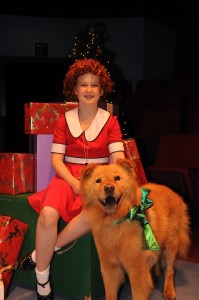COMMUNION
If the Ahmanson Theater is akin to a cathedral (elevated rules of decorum apply, and a certain dress code, and it’s expensive and showy in such a way as to invite your tithe and your awestruck adoration), the Glendale Centre Theatre is more like a Universalist meeting house that grew out of a commune, now run by reformed hippies as a rec center.  At GCT, less emphasis is placed on the hallowed traditions of Theater as Cultural Institution and more on simple pleasures: the reassurance of old jokes and family. In its way, the result is arguably more uplifting than the patrician virtues of more “serious†halls.
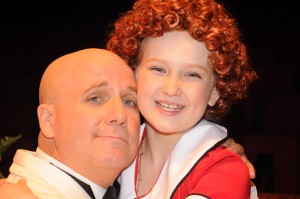 At GCT, you might see staff snapping at one another behind the refreshment counter, and the owner’s kids running around in the nosebleed seats during the show; but the tickets and the lemonade are cheap, and the seats, new last season, are the most comfortable of any theater in town. You won’t see Chekhov or Ibsen here, but you’re guaranteed the opportunity to revisit the farces, potboilers and musical comedies you grew up with. Many young people see their first live entertainment here, and might even get their first chance to be in one. One young lady in Michael Sterling’s revival of Annie  is currently making the most of that giddy moment, as are one swing actress’ dad and two cast members’ dogs. The majority of the ensemble has played here often enough to consider this a home. The whole thing’s about as sweet and sentimental as a reunion at your kooky aunt’s house.
At GCT, you might see staff snapping at one another behind the refreshment counter, and the owner’s kids running around in the nosebleed seats during the show; but the tickets and the lemonade are cheap, and the seats, new last season, are the most comfortable of any theater in town. You won’t see Chekhov or Ibsen here, but you’re guaranteed the opportunity to revisit the farces, potboilers and musical comedies you grew up with. Many young people see their first live entertainment here, and might even get their first chance to be in one. One young lady in Michael Sterling’s revival of Annie  is currently making the most of that giddy moment, as are one swing actress’ dad and two cast members’ dogs. The majority of the ensemble has played here often enough to consider this a home. The whole thing’s about as sweet and sentimental as a reunion at your kooky aunt’s house.
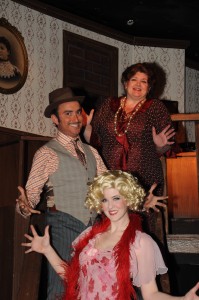 Annie is Annie; you know it even if you don’t know it: the 1977 Broadway musical adapted from Harold Gray’s comic strip Little Orphan Annie, about a plucky 11-year old (Emma Howard) tirelessly escaping and re-escaping her Dickensian orphanage, cheered on by her fellow forgotten girls in the search for a “real†family (the six precious savages are Asia Aragon, Brooke Lynn Boyd, Bella Briscoe, Leah Schraff, Lucy Taylor, and Katherine Marie West). Abetted by a smitten industrialist (Peter Husmann as Daddy Warbucks) and his secretary (Heather Dudenbostel as Grace Farrell), threatened by a drunken matron (Dynell Leigh as Miss Hannigan), her vicious brother (Clayton Ferris as Rooster), and his ditzy squeeze (Christa Hamilton as Lily St. Regis), Annie dances and sings her way through New York City during the winter of 1933. Will she be adopted by a billionaire or “got rid of†by villains? Will Franklin Delano Roosevelt (Don Woodruff) help her prospects for a chicken and a pot to put it in? Will her dog Sandy end up a free mutt or an all-too-brief guest of the state? The answers are told in good songs (music by Charles Strouse, lyrics by Martin Charnin) and a well-plotted melodrama (book by Thomas Meehan) with instantly lovable and despicable characters.
Annie is Annie; you know it even if you don’t know it: the 1977 Broadway musical adapted from Harold Gray’s comic strip Little Orphan Annie, about a plucky 11-year old (Emma Howard) tirelessly escaping and re-escaping her Dickensian orphanage, cheered on by her fellow forgotten girls in the search for a “real†family (the six precious savages are Asia Aragon, Brooke Lynn Boyd, Bella Briscoe, Leah Schraff, Lucy Taylor, and Katherine Marie West). Abetted by a smitten industrialist (Peter Husmann as Daddy Warbucks) and his secretary (Heather Dudenbostel as Grace Farrell), threatened by a drunken matron (Dynell Leigh as Miss Hannigan), her vicious brother (Clayton Ferris as Rooster), and his ditzy squeeze (Christa Hamilton as Lily St. Regis), Annie dances and sings her way through New York City during the winter of 1933. Will she be adopted by a billionaire or “got rid of†by villains? Will Franklin Delano Roosevelt (Don Woodruff) help her prospects for a chicken and a pot to put it in? Will her dog Sandy end up a free mutt or an all-too-brief guest of the state? The answers are told in good songs (music by Charles Strouse, lyrics by Martin Charnin) and a well-plotted melodrama (book by Thomas Meehan) with instantly lovable and despicable characters.
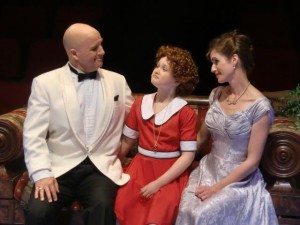 Michael Sterling does a crackerjack job wrangling seventeen young adults and grown-ups, seven little girls, and those two canines (what do they say about working with kids and animals? “Don’t,†isn’t it?) into a delightful and emotionally engaging entertainment. The pace never flags, and the energy stays as high as the standards at his supper club. No story tells itself, and his taste and judgment have helped him shape the language of musical theater into a sugared poem. Miss Howard, his show-carrying star, can hold a note longer than most eleven year olds can hold their tongues, and seasoned hands like musical director Steven Applegate and choreographer Jerry Evans know how to whip a cast into a company. Angela Wood’s capacity as a costumer is long and deep: each of the extensive array of outfits is period-appropriate and sharp-looking. How sharp? Daddy Warbucks’s suit is as well cut as any of Mr Sterling’s. That’s sharp.
Michael Sterling does a crackerjack job wrangling seventeen young adults and grown-ups, seven little girls, and those two canines (what do they say about working with kids and animals? “Don’t,†isn’t it?) into a delightful and emotionally engaging entertainment. The pace never flags, and the energy stays as high as the standards at his supper club. No story tells itself, and his taste and judgment have helped him shape the language of musical theater into a sugared poem. Miss Howard, his show-carrying star, can hold a note longer than most eleven year olds can hold their tongues, and seasoned hands like musical director Steven Applegate and choreographer Jerry Evans know how to whip a cast into a company. Angela Wood’s capacity as a costumer is long and deep: each of the extensive array of outfits is period-appropriate and sharp-looking. How sharp? Daddy Warbucks’s suit is as well cut as any of Mr Sterling’s. That’s sharp.
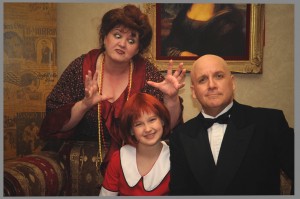 The Glendale Centre Theatre experience, entire, is something unto itself. In its 65th season of continuous operation, this community stalwart has its schtick down pat: the sound mix between the miked performers and the canned score is always a little wonky; the dancers are usually a nice mélange of training and talent, though the acting can run the gamut. And while most of the singers clearly have musical or opera experience, some can’t hit the important notes. But, see, that makes all the difference between this and a less lovable show, because sitting in the round (like a family) at this particular table (gravy on the cloth; tipsy uncle pulling funny faces to make the cousins giggle while Grandpa says grace) evokes a sense of community that you simply can’t get for five times the price at the Geffen Playhouse.
The Glendale Centre Theatre experience, entire, is something unto itself. In its 65th season of continuous operation, this community stalwart has its schtick down pat: the sound mix between the miked performers and the canned score is always a little wonky; the dancers are usually a nice mélange of training and talent, though the acting can run the gamut. And while most of the singers clearly have musical or opera experience, some can’t hit the important notes. But, see, that makes all the difference between this and a less lovable show, because sitting in the round (like a family) at this particular table (gravy on the cloth; tipsy uncle pulling funny faces to make the cousins giggle while Grandpa says grace) evokes a sense of community that you simply can’t get for five times the price at the Geffen Playhouse.
 Take Copper, the dog playing Sandy. Copper’s a 13 year old charmer, trained by Robert Thomas, who rescued him from the pound. He’s remarkably well-behaved, not least because he’s arthritic and pretty much blind and deaf. The magnitude of sentiment inspired by this casting choice is not difficult to measure. You see this elderly creature listing his way onstage, head cocked with the effort to see and hear, and you say “Awww.â€Â Casting score: 1000. Evita, the dog who makes a single-scene cameo as an ill-fated stray, is also a rescue. Found on the theater grounds and adopted by Nick Mizrahi, she weighs about a pound in physical terms but a hundred times that in appeal to your sympathies. But wait; there’s no second dog in the book; why is she here? She’s here because this place is about loyalty and affection as much as it’s about anything.
Take Copper, the dog playing Sandy. Copper’s a 13 year old charmer, trained by Robert Thomas, who rescued him from the pound. He’s remarkably well-behaved, not least because he’s arthritic and pretty much blind and deaf. The magnitude of sentiment inspired by this casting choice is not difficult to measure. You see this elderly creature listing his way onstage, head cocked with the effort to see and hear, and you say “Awww.â€Â Casting score: 1000. Evita, the dog who makes a single-scene cameo as an ill-fated stray, is also a rescue. Found on the theater grounds and adopted by Nick Mizrahi, she weighs about a pound in physical terms but a hundred times that in appeal to your sympathies. But wait; there’s no second dog in the book; why is she here? She’s here because this place is about loyalty and affection as much as it’s about anything.
Consider the case of Leah Schraff, the littlest orphan, who in the Christmas-morning scene of a recent performance tripped and fell flat on her 6-year-old face. You’ve seen this a million times at your own holiday gatherings: a little kid konks her head and, more scared than hurt, lies there for a second debating whether it’s bad enough to start the tears and snot. Well, this time it happened on a stage in front of a couple of hundred people. The room’s emotional headline moved in an instant from “Imp Receives First-Ever Xmas Present†to “Oh My God, Is the Baby Alright?â€Â Everyone in the house grabbed his neighbor. All the mothers leaned forward in an involuntary gesture of consolidated maternity. Ms Dudenbostel swept the urchin up, cradling and soothing as she whisked her offstage; Mr Husmann interrupted his line to make sure the kid was okay; and the show soldiered on. But the audience wasn’t quite okay until Miss Schraff came out, tear-stained trooper that she is, for the curtain call. Then we exhaled, finally, our own tears of gratitude for this communion.
When’s the last time you felt that brand of uplift at the Mark Taper Forum?
photos by Nathan Milisavljevich and Deborah Dubin
Annie
Glendale Centre Theatre in Glendale (Los Angeles Theater)
scheduled to end on June 30, 2012
for tickets, visit http://www.glendalecentretheatre.com

